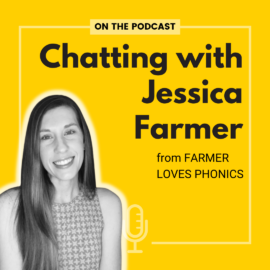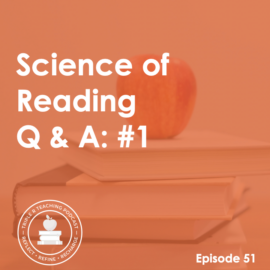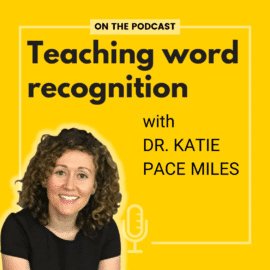
TRT Podcast #136: Making change at the district level: A conversation with Cliff Jones
Cliff Jones walks us through how his district shifted from balanced literacy to teaching based on the science of reading. Listen in to find out how all teachers were educated and supported!
Listen to the episode here
Full episode transcript
Hello, Anna Geiger here from The Measured Mom, and we're continuing our Change Maker series. This week I'm speaking with Cliff Jones, who is the Chief of Staff of Fulton County Schools. Today he's going to talk to us about how their district moved to a science of reading based approach. He'll share how the teachers became educated, and how they switched out their old materials for materials that are based on the science of reading. I know you're going to get a lot out of today's conversation.
Anna: Welcome, Cliff!
Cliff Jones: Thanks, Anna. Thanks for having me!
Anna: Can you tell us about your current position and what in your history of education has brought you here?
Cliff Jones: Sure. I'm the Chief of Staff of Fulton County Schools. What got me here, I think I just kept raising my hand, Anna. I was a teacher of world history in 2001, then an administrator, high school principal, here in the Atlanta area, and then I was the Chief Academic Officer here in Fulton County Schools from 2018 until July of this year.
Anna: Okay. And then you switched, so now what are you doing?
Cliff Jones: So as the Chief of Staff, I support the superintendent not only with community needs, but I also am over all the zone superintendents. We have 108 schools in Fulton County, and so we have different zones, we have seven zone superintendents. It's a big organization, but we really try to make it feel small.
Anna: Yeah. So before we started recording, you mentioned that around 2019 or so you had a new superintendent, is that right?
Cliff Jones: That's correct. In 2019, Dr. Mike Looney came from Williamson, Tennessee to here in Fulton County, and he brought a love of teaching literacy. I remember one of our first visits to a school was him doing the carpet time, and as a former high school guy, Anna, that was new to me, and we've been learning together ever since.
Anna: So he brought, we could say, the science of reading into your district and started by sharing some information with you. Can you walk us through the process?
Cliff Jones: Sure. We had this early discussion and he asked me really direct questions like, "Cliff, what do you know about the science of reading?"
I said, "Dr. Looney, I'm a balanced literacy guy. I know a lot about certain literacy experts and different workshop models, and I try to make sure that my teachers have time and resources to do that, to create a really rich love of reading in their classrooms in this environment that's holistic."
He said, "Cliff, I need you to read the research and work from the literacy panel, the National Reading Panel," and we talked about that one afternoon.
The next morning I came in and he had this huge document that he had printed out and waiting for me. That really is what got me started on my learning around the science of reading and I've really been on fire for it ever since, Anna.
Anna: Those words you said could have come from my mouth too, those exact words. For me it was Emily Hanford's article that talked about three-queuing as being an issue. I'm not sure what else would've spoken to me that quickly, although it took me a little while to accept her words.
What was it in the document that really got your attention? Because shifting from balanced literacy is a switch that can be hard to make.
Cliff Jones: I had to learn not only that there were five pillars of reading, but that one was insufficient, even four were insufficient! You needed all five.
When I thought about literacy instruction before I learned that, I knew about phonics, I didn't really know what phonemic awareness was, I knew what vocabulary comprehension was, and I kind of knew what fluency was, but I really thought about maybe three out of five. That's good in baseball, but not really good when you're trying to teach reading.
So it was the understanding of creating systems and structures related to all five pillars, plus writing, that I really dove into as I've been learning. I completed LETRS training, Anna, and I'm glad they didn't post my grade, but it was a certificate of completion for me. I learned so much, so much through that.
Anna: One thing you mentioned was the five pillars. We know those are called the five pillars because they're the big areas that the National Reading Panel summarized in their report.
When I think of balanced literacy, I think of activities, which you kind of mentioned before. Like we structure our classroom around read aloud, shared reading, guided reading, and independent reading, without really understanding exactly what skills are part of all those and not really being able to nail it down.
I think sometimes when you start diving into the actual step-by-step, it starts to come together and make more sense. It fills in the gaps quite a bit so that can be very exciting.
But I know that asking teachers to make a big shift is not always easy. Can you walk us through how you guys did that?
Cliff Jones: Yeah. This was probably the biggest emotional piece of the journey that I had as a leader. I really look towards my teachers as experts. They look at themselves through their heart and their passions to be able to bring literacy to life for their students.
As we started our LETRS journey, we quickly started to understand that we didn't know everything, that our teachers had not been set up through their college prep programs to know everything. As a matter of fact, as we started to listen to the podcast that you mentioned and some other experts, we realized we were misled.
This realization that we had poured into the workshop model in our own balanced literacy journey here in Fulton County schools was emotional, because we had to start to realize that what we had been doing was wrong. When I say that, it's not lost on me, the emotional piece to that, because I've seen teachers go through the stages of grief related to that new learning.
There's no teacher that I've met out there that says, "Hey, I want to teach a kid to read incorrectly." No, they're doing the best they can with what they know.
So we started down our LETRS journey, and we started to really look at high quality resources related to the five pillars. That's how we went, and we started to realize early on that we were going to have to do an inventory of what was out there. We are a site-based management district, we have over 108 schools. I probably had 40 different types of reading resources there. Who could even guess how many experts had come to our district and left their wares.
So we started to think about how best to make that transition and the most painful realization, Anna, was that we were going to have to take away those resources to replace them with science of reading literature and science of reading curriculum.
We started doing that, and I did receive some nasty grams, but I also made a commitment to everybody who reached out to me that I was going to respond to them.
Really what I started to do was we had this collective time of grief where we thought we were supposed to do it one way, and then we realized through our own learning that we really needed to do it in another.
Collectively, I'm happy to say at this point, we have a really strong culture of literacy in Fulton County Schools. As a matter of fact, if you go on to Twitter, or whatever it's called now, search #EveryChildReads and you can follow our journey. You can see it progress from a couple of years ago to people now posting what they're seeing from their students, their phonemic awareness activities, to their phonics activities, to vocabulary.
I was in a middle school the other day and we were breaking down words into their different parts. It was a reading class, and these are students who needed that part of the process to be able to understand the words in front of them, and it was just amazing.
I feel like we've come such a long way, but I'm not going to underestimate to you, or whoever's listening, the emotional journey that we've been on.
Anna: So you started by giving all the teachers the LETRS training, is that correct?
Cliff Jones: That's correct. So our early teachers, our K-5 teachers received LETRS training. As a matter of fact, they finish up their 80 hours, and I always say that, 80 hours of training this December. Their principals, all of their principals, went before them, and all district staff went before them. So they're the third cohort to go through LETRS training here in Fulton County Schools, and we have five cohorts.
Anna: I love that, that their leaders went first. That's fabulous. I don't know how often that's happening.
Cliff Jones: I haven't heard of it either. I don't know if we just fell into it or if it's from the science of implementation, change management from Kotter, creating that collaborative group coalition of the willing. But if the leaders aren't engaged, they're not going to know how to create the structures. I certainly didn't know how to listen empathetically until I went through LETRS.
Anna: So the leaders went through it first, and then were you not really doing much of anything with everybody else at that time? You were just doing your own learning and waiting?
Cliff Jones: So EVERYBODY knew we were doing this, so we had this sort of... We use Microsoft and we have these little Teams channels, and people would invite me in to their Teams channels and it would be a PLC (professional learning community). They would just call me in and say, "Hey Cliff, can you talk about what you learned in this volume?" And it would be a third grade PLC at a particular elementary, and they knew that we were doing this as a leadership group and they were curious. They were curious from almost a critical lens, "Well, how is this going to impact us?"
Anna: Yeah, worried maybe a little bit.
Cliff Jones: Yeah.
Anna: So I know I've seen some teachers complain that our school, our district, whatever, expects us all to do LETRS, but we don't have time. How did you manage that piece of it?
Cliff Jones: First of all, that is a very legitimate concern. Having gone through it, LETRS is very time-consuming. What we did is we associated all of our professional learning days in our district to LETRS training. We actually asked for more this last year just so that we could do this and teachers could do this on the clock, and then do the bridge to practice throughout the month between the professional learning days. That has been huge.
The other thing for us is we provided stipends. So for the first four volumes, when you complete that, you get $1,250 in our district. You can make $2,250 just by completing LETRS in two years.
We found the balance of professional learning days, stipends, and then creating a lot of positive energy about what we were learning has really been beneficial, and people are buying in.
Anna: So during that training, were there many voices that didn't like the training or felt like... What kind of things did you hear and how did you handle that?
Cliff Jones: Yeah, so I think there were probably, at the minimum, three different groups.
You have the folks who are on fire that say, "I've heard about this, I want this!" They're really pushing us, "How can we go faster?" You have that group. Really their complaint to us was, "Why can't I just go ahead and knock this out? Why do I have to wait on my peers?"
We told them, "No, no, we need to do this collectively."
Then we had this other group that was, I would say, just neutral. "Okay. I'm not really seeing... I did this already in my class. It might not have been the right time, but sure, I taught a little phonics here. I did a little fluency there. I'm not sure why I have to understand why the kids' brains work the way they do," and they were really just waiting it out."
And then I did have some folks who were resistant. Usually it went like this, Anna, "My classroom of students at my school all read at or above grade level." MY classroom. MY school.
A lot of times I just had to answer, "You're very lucky. I'm not disagreeing with you. Maybe there are pockets where balanced literacy had its place and was working. But when we think about the totality, I've got 55,000 kids K-5, and I know that the science says 95% of them can read at or above grade level, that's what LETRS teaches, but as Fulton County, we're only at 70%. I know that we can do better, and I know that we need this training, and I know to get to that 95%, we've got to do something related to the research and what works."
Anna: So at what point during the LETRS training did you start culling the material that some teachers maybe wanted to hold onto?
Cliff Jones: Yeah, so that was at the end of '22, the end of 2022 school year, and everybody knew it was coming. We had done this huge inventory. It wasn't something that surprised anyone.
The reason that we gave was that we have new materials coming in the summer that are associated. We had schedules, Anna, that this is when you're going to teach phonemic awareness, this is when you're going to teach phonics, this is when you're going to use your basil, this is when you'll do Vocabulary Surge, whatever. We had all different types of times.
So all those were coming, but what we did is we started to be able to sell some of our workshop materials and then allow teachers in schools to utilize some of those funds locally. We tried to incentivize it that way. That didn't make it a lot easier, trust me, but at least it was a strategy.
I will tell you, that was probably one of the hardest leadership moments I've had because it was seeing how passionate teachers were, not just about the curriculum, this is not just about the curriculum. People undermine the argument, they just think it's curriculum. It's not, it's how they impact kids. This is the avenue, the street. This is how they do their craft, their magic. That's what I was taking away, and I got that, and now I think we've replaced it with better things and better learning, and I feel like we've really created a lot of positive learning.
Anna: Have you seen teachers that were very resistant come around?
Cliff Jones: Yes. Yes, yes, yes. I've seen leaders and teachers resistant to it.
We had model schools for certain workshop models. Their whole staffs, in five years, had gone off to a northern city and come back from on high and had learned how to do all these things. The resistance there was, number one, related to the new learning around the science of reading through LETRS, and number two, related to the materials.
Here's where I'm starting to see it coming around. I don't hear about that workshop model anymore. I don't hear about, or see travel requests, or get requisition requests to go to different places. Everybody loves, is it Tim Shanahan's Saturday email that comes out? There's talk about, what is the research going to say this week? That's when I know, when I feel like we've really tipped the scales for the science of reading. When teachers are looking forward to knowing, what does the research say?
Anna: Yeah, that is a huge shift. Huge.
What is your continuing plan for keeping this in front of all the teachers? Does every new teacher go through LETRS? How does all that work?
Cliff Jones: Yeah, so we have a new cohort of leaders and teachers every year. Again, I'm a big district, so things are at scale, and those kinds of systems are in place. Our board is really looking at, how do we make a sustainable effort to keep the culture of literacy in the forefront? They're looking at redoing their strategic plan with some different aspirational goals related to children at or above grade level in certain grades. The biggest sustainability piece, to me, is really celebrating our students.
We also have other programs for our special needs students. Lindamood-Bell is a huge effort here in Fulton County Schools. Our teacher of the year this year is a sixth grade resource special ed teacher who can just crush some Lindamood-Bell. She understands the importance of her LETRS training, and then with the Lindamood-Bell strategies as well, she can just light a fire and is showing people the impact of what it does with your students, for all students.
That's really the key, it's the buy-in to ALL. There are some students who we get as a district who know how to read when they enter in our schools. That does happen. But when we think about what ALL means and getting to that 95%, and then celebrating that light coming on, that's the difference between what we do every day and what everybody else does for work.
Anna: Yeah. So have you had anybody say, "This is going to bore my more advanced kids. They don't need this." Has anything like that come up, and then where they've seen that there's actually a benefit for everyone?
Cliff Jones: I have. When you're teaching a kid how to break down a word and break it into its parts, and if they're a third-grader, then we can translate those parts into upper level vocabulary. That's where I lean in with that argument. Aren't you just doing an SAT skill? As we learn our vocabulary, isn't that what the high school teachers are doing to break down really complex SAT words?
Here's a fun fact for you, Anna, related to that. In our buses. Okay, I want you to put yourself in one of those bus seats, and then on the top of the roof, we have magnetized prefixes and different word parts so the kids can create different words in the bus.
Anna: Oh, that's amazing.
Cliff Jones: What we've done with the bus drivers is given them a little packet, a little Ziploc bag, of different words that they can then say over the intercom to see who can make that word when it's safe to do that and everything.
I love that piece of our story because it shows just how comprehensive literacy has become in our district.
Anna: That is very cool. Very cool.
So in closing here, I get a lot of emails from people that say, "Nobody in my school's really on board. I'm kind of a lone wolf. Nobody's interested." Some people even say, "My scores are going up and nobody cares," because they're maybe measuring with a different tool like a benchmark assessment from Fountas and Pinnell or something that doesn't even measure what this person's measuring and they just feel lost, and they're not in the position that you are to make big changes. Do you have any suggestions for the regular teacher who just feels like no one's listening?
Cliff Jones: First, I just want to reach out to them and hug them. This is a big change. This is a very big change, and I can't imagine it doing this in isolation. Here are a couple of things that I would do in that scenario.
Number one, there's a huge community now around the science of reading, and if you're isolated within a building, reaching out to other professionals outside of that. Listen to podcasts. I get on to different blogs, and I write different people.
But I would also say, invite your leadership in. If you've learned a new skill related to the science of reading and you want to put that on display, the way to change things outside your classroom is to convince that building leader/district leader of what you're doing. The only way really a lot of times to do that, Anna, is to have them see it, have them see you just ignite those kids' passions right there in front of you.
This is a wave of what's going on nationally, and really to me, it's how soon are we all going to adopt this and how long are we going to sustain this? Because we've known this since 2000. We've known the science of reading and its five pillars. It's really been the lack of courage with a lot of leaders, me included, to truly unpack this, to do it with fidelity, to get the future results that I know that will take place.
So I share that with a teacher because we've all been isolated at one point, but this is the wave that's here. Showing off what you've learned to different people, being part of a community of learners, and knowing that you're doing what's right for kids. When the research says this is what's right for kids, it's hard to be on the other side of that.
Anna: It also helps to know that in your district, it was just one person who got the ball rolling, and look what's happening now. It just takes one person to talk to the right person to get things started, so that's an encouraging thing too.
Cliff Jones: That is.
Anna: Well, thank you so much for sharing! I know that a lot of people are going to get a lot out of what you had to share today.
Cliff Jones: Thanks, Anna, and I'll leave you with again, the hashtag, #EveryChildReads. It's Fulton's journey related to the science of reading, and I just really encourage people to have a look through it. I'm really proud of where we started and where we are now.
Anna: Thank you.
You can find the show notes for today's episode at themeasuredmom.com/episode136. I'll make sure to include the National Reading Panel's report that Cliff talked about that was dropped off at his desk, as well as other resources that I think will help you on your journey.
Sign up to receive email updates
Enter your name and email address below and I'll send you periodic updates about the podcast.
Resources related to this episode
- National Reading Panel report
- Science of Reading Symposium with Cliff Jones
- Fulton County School’s science of reading journey on Twitter #EveryChildReads
- LETRS training
Looking for structured literacy resources?

Our membership has hundreds of printables for teaching phonics – not to mention decodable passages, complex texts, poems, plays, and more!







Leave a Comment